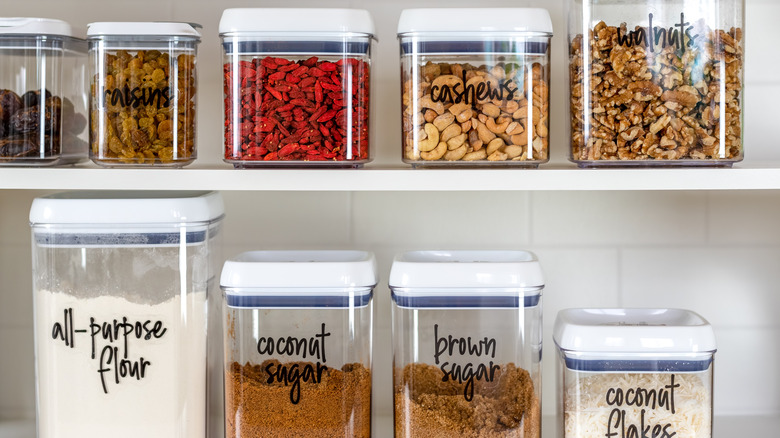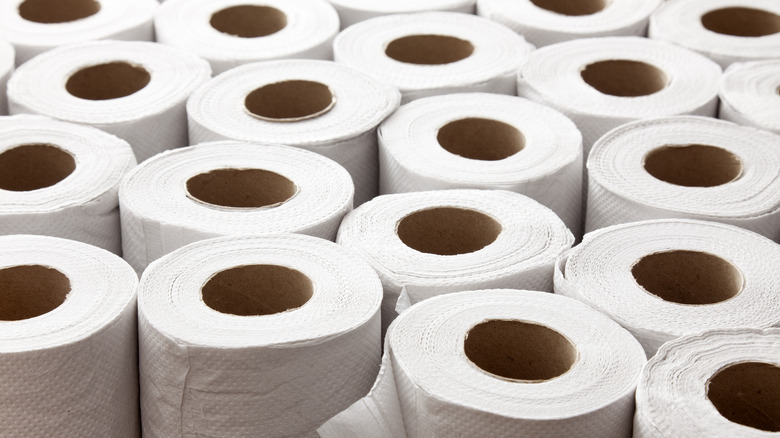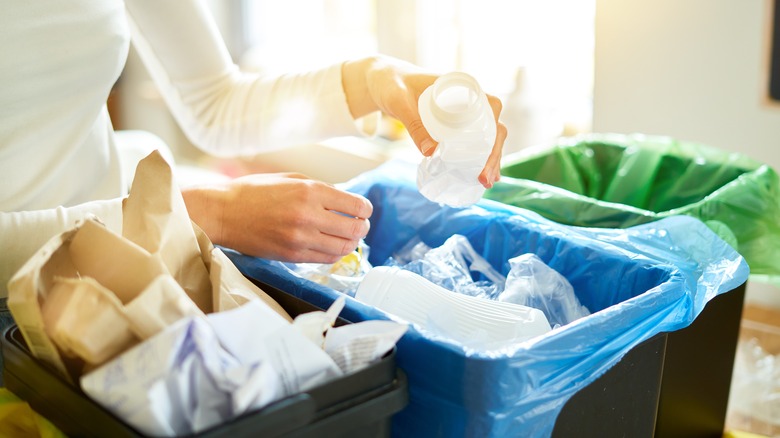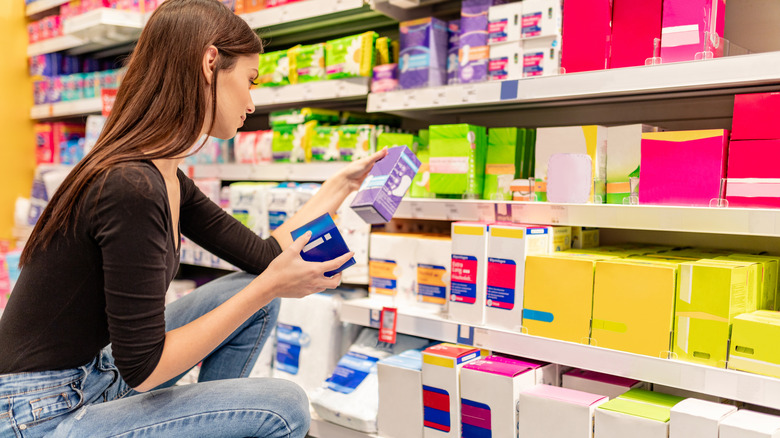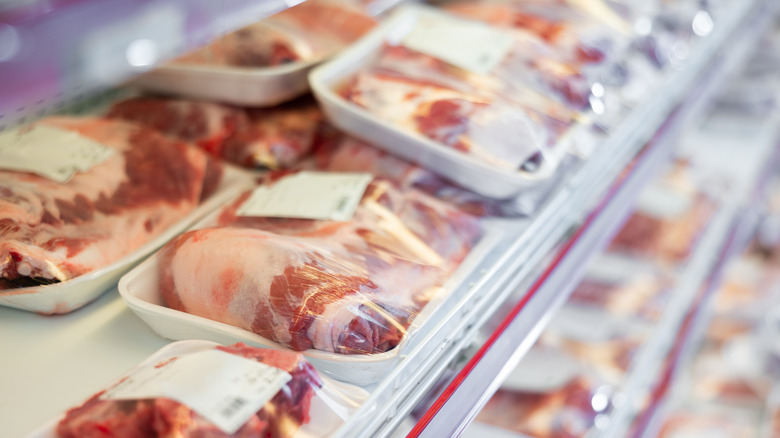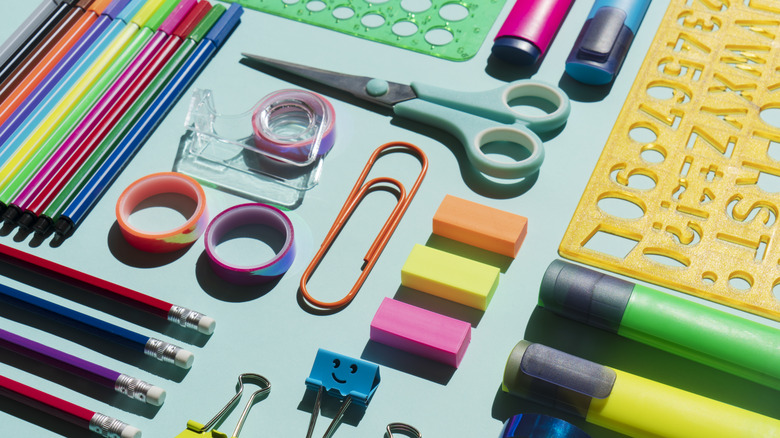Common Household Items You Should Be Buying In Bulk To Save Your Money
We may receive a commission on purchases made from links.
Whether you're living as a single person or as a member of a large family, it can be expensive to run a household. Buying certain items in bulk quantities can help to stretch your budget. It pays to do some research to find retailers that sell products in bulk volumes, and you want to be selective about the types of supplies that you purchase in large quantities.
Take note of the items that you buy and use most frequently, and assess your available storage space. Additionally, you should consider the expiration dates and shelf lives of the products. Don't buy anything in bulk unless you know you'll use it before it expires or goes bad. Things like paper products, dry pantry goods, and toiletries are sensible bulk purchases. With careful choices and the willingness to spend a little more upfront, you can save money in the long run with bulk buying. The key to making smart decisions is to always calculate the unit price when you're comparing costs of bulk and non-bulk purchases.
Canned food and dry pantry items
To save money on your grocery bills, it makes sense to buy some food items in bulk. That is, the foods that have a long shelf life, remaining usable for months or years. The list includes canned fruits and vegetables as well as canned beans and soups. Additionally, you can stock up on dry grains like rice and quinoa along with dry beans and dry cereals. Nuts and oils can last for up to a year, and canned tuna can last 3 to 5 years.
When you're shopping for food items to buy in bulk, consider the price comparison between large and small quantities. For example, Walmart offers a 20-pound bag of Royal white basmati rice for $20.76, a unit cost of 6.5 cents per ounce. Alternatively, you can buy a 2-pound bag of the same rice for $3.98, and the unit cost is 12.4 cents per ounce. White rice has a long shelf life, and it's a versatile ingredient in many recipes. Considering these factors, it might be worth the upfront expenditure to stock up on rice with the 20-pound bag.
Keep dry pantry items stored in airtight containers, in cool places, and away from light. Always check the expiration dates before making bulk purchases, and only buy what you'll use within the allotted time. Finally, it's important to monitor your available storage space before you make the purchases, ensuring that you have room for bulk quantities of food.
Household paper products
We use and dispose of multiple household paper products every day, including toilet paper, facial tissues, dinner napkins, and paper towels. It's a frustrating scenario when you don't realize you're out of paper towels until you finish your last roll and reach for a replacement. With bulk buying, you can ensure that you always have plenty of supplies on hand. In fact, paper products are the perfect candidates for buying in bulk. They don't have expiration dates or shelf lives. The only downside might be having enough storage space to keep bulk quantities of paper products in the house.
To get the best deals on these products, you'll want to calculate the unit prices for paper products. For example, Costco sells a package of 12 rolls of Kirkland paper towels for $22.99. Each roll includes 160 sheets that measure 11 inches by 7 inches, each. This translates to 1,026 square feet. Conveniently, Costco states that the unit price per 100 square feet is $2.24. That's only 2 cents per square foot.
When you're shopping for bulk quantities of paper products, don't purchase a product of inferior quality simply because it's on sale. Shop around to get the best deals on products you'll be satisfied with. If you live in a small space with limited storage capacity, consider partnering with friends or family members to buy paper products in bulk and divide them between two or more homes.
Toiletries
If you have storage space in a bathroom closet or vanity, it's a great idea to purchase toiletries in bulk. Suggested items include soap, body wash, shampoo, hair conditioner, shaving cream, razors and blades, toothpaste, mouthwash, floss, tooth brushes, and deodorant. Especially in busy households with large families, it saves time and money to keep an ample supply of toiletries on hand for everyone in the family. Some items, like dental floss and toothbrushes have no expiration dates while other toiletries last for months or years.
To determine if a bulk-buying deal is worth the money, you can make a comparison between buying in bulk and purchasing a single item. Sam's Club sells a package of 5 tubes of Crest Kid's toothpaste for $4.48, with each tube weighing 4.6 ounces. The unit price is 19 cents per ounce. By comparison, Kroger sells one 4.6-ounce tube of the same toothpaste for $2.19. The unit cost is 47.6 cents per ounce. In this case, the bulk purchase saves you more than half the cost.
Buying toiletries in bulk can be a money-saving strategy if you're realistic about the quantities you'll use within the shelf-life period of each product. For example, an opened container of shampoo or hair conditioner may go bad within 6 to 12 months. Look for an expiration date such as "12M,", where M stands for months. On the other hand, an unopened bottle of shampoo can last 2 to 4 years.
Plastic bags for garbage and storage
Although we're conscious of the environment and try to cut down on our use of plastics, many of us continue to use plastic bags for trash disposal as well as storing food and household items. You can save money by making bulk purchases of plastic trash bags in various sizes, sandwich and snack bags, food storage bags, freezer bags, plastic wrap and aluminum foil.
You can make a bulk purchase of 200 kitchen trash bags in the 13-gallon size at Costco for $20.49. The unit cost is 10.2 cents per bag. By comparison, a box of 40 bags in the same size costs $9.79 at Wegmans, representing a unit price of 24.4 cents per bag. Looking at the per-bag unit cost, you can see that the purchase of a smaller quantity costs more than twice the amount of the bulk purchase.
Similar to paper products, plastic bags have indefinite shelf lives with no expiration dates. On top of that, the bulk quantities of plastic bags are packaged in compact boxes for storage. With these characteristics, plastic bags and wraps are the ideal products for bulk buying.
Cleaning products and supplies
In every household, there's a supply closet or cupboard full of cleaning products. These include bottles and cans of commercial household cleaners, laundry detergent and bleach, dryer sheets, sponges, microfiber cloths, replaceable pads for mops and dusting wands, and the list goes on. If you have available storage space, you can save money by purchasing some of these items in bulk quantities.
For example, Amazon sells a 12-pack of Home Excell microfiber cleaning cloths for $6.99, a unit cost of 58 cents each. Alternatively, you can buy the 24-pack of the same cleaning cloths for $11.99, a unit cost of 50 cents per cloth. That's a 14 percent saving when you purchase in bulk.
When you buy cleaning products in bulk, it saves time as well as money. You can keep your utility closet well-stocked with supplies and avoid frequent jaunts to the store for replacements. Take note of how much you use over time, and only purchase the product amounts that you'll use up before they start to lose their effectiveness. For example, antibacterial disinfectant sprays last approximately 1 year and laundry detergent is good for about 6 months. It pays to do some research on the shelf life of cleaning products before you buy in bulk. If you don't use them before they lose their potency, you'll end up negating the money-saving effect of bulk buying.
Batteries and light bulbs
We use more and more electronic devices in our daily lives, and we frequently find ourselves rummaging through drawers and cupboards to find replacement batteries. To solve the frustrating problem of running out of batteries, you can buy in bulk and keep them on hand. Before you buy, take note of the types of batteries that you use most frequently. In most households, these include AA, AAA, C, D, and 9V batteries. Bulk buying makes sense because alkaline batteries have a shelf life of 5 to 10 years, and lithium batteries are good for 10 to 20 years.
The Home Depot sells a 4-pack of Energizer AAA batteries for $4.87, a unit price of $1.22 per battery. If you pay more up front, you can buy the bulk pack of 48 AAA batteries for $29.98, a unit price of 62 cents per battery. By making the bulk purchase, you'll save 60 cents per battery.
While you're stocking up on batteries, don't forget to purchase light bulbs for the lamps and fixtures in your home. You can save money by purchasing the most-used types of bulbs in bulk. For example, Amazon offers the Sylvania LED 60W light bulb in a 4-pack for $5.79, a unit price of $1.45 per bulb. But if you opt for the 24-pack at a cost of $29.99, the unit price is $1.25, and you save 20 cents per bulb.
Baby diapers and wipes
Families with babies and toddlers go through lots and lots of diapers. Significantly, this is a product that you don't want to run out of. It saves time, money, and late-night runs to the store when you buy diapers, wipes, and pull-ups in bulk.
Membership warehouse clubs like Costco, Sam's Club, BJ's, and Amazon Prime sell diapers at prices that are much cheaper than grocery stores. With a nonperishable item such as diapers, it makes sense to stock up with bulk purchases when you order online or visit a discount warehouse.
Buying diapers in large-quantity packs saves money. Target sells a pack of 21 Pampers Cruisers, size 4, for $9.99, a unit price of 48 cents per diaper. But you can select the 116-count pack of the same diapers for $45.99, a unit price of 40 cents per diaper. You'll be saving 8 cents on each diaper. For even greater savings, you can purchase a big box of 198 Kirkland diapers from the membership buying club Costco, and the unit cost will be only 23 cents per diaper.
Feminine hygiene products and incontinence pads
Approximately half the population uses feminine hygiene products for around 40 years of their lives. Additionally, many adults depend on incontinence pads for sanitary absorbency needs. These items have indefinite shelf lives with no expiration dates, making them ideal for buying in bulk. Although you'll need to spend more money upfront, the bulk purchases will save you money in the long run.
Consider these price comparisons when buying feminine hygiene products from Amazon. A pack of 44 Always Ultra-thin feminine pads costs $13.75, representing a unit price of 31 cents per pad. On the other hand, if you order the 3-pack quantity, you'll get 132 pads for $16.85, and the unit price drops to 13 cents each. That's a savings of 18 cents per pad over the non-bulk price.
For incontinence and postpartum absorbency and protection, you can purchase the Amazon Basics underwear in size Medium for $14.34 per pack of 20. This price represents a unit cost of 72 cents per pair. Spending a bit more money up front, you can buy the 60-count package for $39.87, and the unit price drops to 66 cents each, saving you 6 cents per pair.
Pet food, kitty litter, and pet poop bags
Pet parents spend lots of money on food and supplies for their fur babies. Especially in homes with multiple pets, the costs can mount up. In addition to saving money, bulk purchases of pet supplies save you time on shopping and transporting the items.
If you have room to store pet food properly, you can stock the pantry with bulk quantities. Unopened dry dog food will last 18 months, but once you open it, you should use the dry food within 6 weeks. To preserve freshness, store dry pet food in an airtight container stashed in a cool, dark place. The nutritional value of the food may diminish if it's exposed to heat, light, and moisture. If your pets eat canned foods, the unopened cans will last for two years on your pantry shelves.
A price comparison from Walmart demonstrates the savings that result from buying dog food in bulk. A 4-pound bag of Purina One chicken and rice formula dry food costs $28.21, or $7.05 per pound. But the 40-pound bag of the same product sells for $60.48, boasting a unit price of $1.51 per pound. Additionally, Walmart offers savings on bulk purchases of kitty litter. For example, the Purina Tidy Cats free and clean, clumping cat litter sells for a unit price of 62.8 cents per pound when you buy it in the 14-pound container. But if you opt for the 35-pound size, the unit price drops to 53 cents, saving you almost 10 cents per pound.
Beer and wine
Are you planning a celebratory event where you'll serve beer and wine to a large group of people? Or, perhaps you want to stock up on your favorites when they're on sale in bulk quantities. Unopened beer lasts 4 to 6 months at room temperature and 6 to 8 months in the fridge. Wine boasts an even longer shelf life. Unopened white wine lasts 1 to 2 years past its expiration date, while unopened red wine is good for 2 to 3 years past the recommended drinking window.
Consider Walmart's prices on Bud Light beer in cans of 12 fluid ounces each. A 12-pack sells for $12.48, representing a unit price of 8.7 cents per fluid ounce. If you select the 24-can pack of the same product, the unit price drops to 7.3 cents. Opt for the 30-can pack, and you'll get a unit cost of 6.9 cents. You save almost 2 cents per fluid ounce when you choose the 30-can pack over the 12-can pack.
When it comes to beer and wine storage, you should keep unopened cans and bottles away from air and light to preserve the flavor until you're ready to consume the contents. Beer is best kept in the refrigerator with bottles stored upright, not on their sides. On the other hand, you should always store unopened bottles of wine horizontally. You do not need to store unopened wine in the refrigerator, but it should be kept in a dark place at a steady temperature between 45 and 65 degrees Fahrenheit.
Vitamins, supplements, and OTC meds
Warehouse membership clubs like Sam's Club, BJ's, and Costco offer some of the best prices on these products. Especially when you buy in large quantities, they beat the grocery stores and drugstore chains. You can buy a package of 100 Tylenol extra strength caplets at Walgreens for $13.99, and you end up paying 14 cents per caplet. At Sam's Club, the 350-count size of the same product costs $16.48, with a unit price of only 5 cents per caplet. At the Kroger grocery store, Flintstones gummies vitamins for kids feature a unit price of 10 cents per gummy when you purchase the large, 180-count package. Alternatively, Sam's Club sells a 250-count size of the same product with a unit price of only 6 cents per gummy.
Wellness items like vitamins and OTC pain relievers have expiration dates. Although the money-saving potential might look attractive when you make the bulk purchase, it means nothing if you don't consume the product before it expires. For best results in keeping bulk quantities fresh, store your meds inside a cabinet, away from heat and moisture. If you have children in the household, add a child-safe latch to the cabinet door.
Meats
You can save money by buying meat in bulk when it's on sale in the grocery store or at warehouse membership clubs. Alternatively, you can buy meat in bulk from local farms or stock up through a monthly subscription service that delivers frozen meats to your door. All these methods are good only if you have enough freezer space to store the meat safely until you're ready to use it. Additionally, it can be expensive to buy meat in bulk, although you'll save money in the long run.
If you have available space in your freezer, buy meats in large quantities to save money on your weekly grocery bills. For example, Wegmans sells a family pack of boneless, skinless chicken breasts for $15.84. It weighs 6.36 pounds, yielding a unit price of $2.49 per pound. Unless you're feeding a big family, you can split up the contents of the large package and store the chicken breasts in smaller packages of two or three. That way, your purchase will provide the basis for several meals over a period of weeks or months.
Use a vacuum sealer like this one from Amazon to store meat safely in the freezer over a long period of time. It's a small appliance that removes the air from inside a plastic bag and seals it, using heat to fuse the bag shut. The sealed plastic bags prevent freezer burn, adding months or years to the shelf life of the meat stored in your freezer. However, FoodSafety.gov recommends that most meat should be used within a year and ground meat should be used within 4 months for optimal food safety and quality.
Home office and school supplies
Office and school supplies do not go out of style, and they don't have expiration dates like foods do. These factors make them ideal for bulk buying. If you have available storage space, you can save money by stocking up on pens, paper, pencils, markers, notebooks, charging cords, USB power adapters, and more. Busy families with multiple school-age children as well as adults working from home can benefit from buying supplies in bulk.
Walmart sells a 6-pack of HP printer and copy paper for $40.98, containing a total of 2,400 sheets. With this bulk purchase, the cost per sheet is only 1.7 cents. Purchase the 60-pack of Bic Round Stic ballpoint pens for $12.92, and you'll get a unit price of 21.5 cents per pen. With a membership at Sam's Club, you can buy office and school supplies in greater bulk quantities for lower unit prices. Sam's Club sells a 10-ream case of multi-purpose printer and copy paper for $39.87. With 5,000 sheets in the case, the unit price is less than 1 cent per sheet. Bic Round Stic ballpoint pens are available from Sam's Club in a 96-count bulk package for $8.68, yielding a unit price of only 9 cents per pen.
Unused ballpoint pens have a shelf life of 2 to 4 years. Paper lasts indefinitely as long as you keep it in the original packaging and in a dry place.

